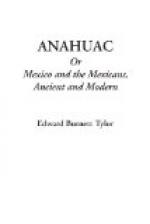* * * * *
IV. GLOSSARY.
ANAHUAC. Aztec. “By the water-side.”
The name at first applied to the Valley
of Mexico, from the
situation of the towns on the banks of
the lakes; afterwards
used to denote a great part of the present
Republic of Mexico.
ACOCOTE (Aztec, acocotl, water-throat), aloe-sucker’s
gourd; see p.
91.
ADOBE, a mud-brick, baked in the sun.
(Perhaps a Moorish-Spanish word.
Ancient Egyptian, tobe, a mud-brick;
Arabic, toob, pronounced with the
article
at-toob, whence adobe?)
AGUAMIEL (honey-water), unfermented aloe-juice.
AGUARDIENTE (burning-water), ardent spirits.
AHUEHUETE (Aztec, ahuehuetl), the deciduous cypress.
ALAMEDA (poplar-avenue), public promenade; see p. 57.
ALCALDE, a magistrate (Moorish-Spanish, al cadi, “the cadi").
ANQUERA (hauncher), covering for horses’ haunches;
see p. 164 (and
cut, p. 260).
ARRIERO, a muleteer.
ARROYO, a rivulet, mountain-torrent.
ATAMBOB, a drum.
ATOLE (Aztec, atolli), porridge.
AVERSADA, a freshet.
BARATILLO, a Rag-fair, market of odds and ends; see p. 169.
BARBACOA, whence English “barbecue;” see
p. 95; a native Haitian
word.
BARRANCCA, a ravine.
CALZONCILLOS, drawers.
CAPA, a cloak.
CAYO, a coral-reef.
CHAPARREROS, over-trousers of goatskin with the hair
on, used in
riding.
CHINAMPA (Aztec, “a place fenced in),”
a Mexican “floating garden;”
see p. 62.
CHINGUERITO, Indian-corn brandy.
CHIPI-CHIPI (Aztec, chipini, drizzling rain); see p. 26.
CHUPA-MIRTO (myrtle-sucker), a humming-bird.
COLEAR, to throw a bull over by the tail (cola); see p. 71.
COMPADRE. COMADRE; French, compere, commere; see p. 250.
CORRAL, an enclosure for cattle.
COSTAL, a bag, or sack.
COYOTE (Aztec, coyotl), a jackal.
CUARTA, a leather horse-whip; see p. 264.
CUARTEL, a barrack.
CUCARACHA, a cockroach.
CUCHILLO, a knife.
CURA, a parish-priest.
DESAGUE, a draining-cut.
DESAYUNO, breakfast.
EMANCIPADO (emancipated negro); see p. 6.
ESCOPETA, a musket.
ESCRIBANO, a scribe or secretary.
FANDANGO, a dance.
FIESTA, a church-festival.
FRIJOLES, beans.
FUERO, a legal privilege; see pp. 19, 249.
GACHUPIN, a native of Spain. Supposed to be an
Aztec epithet,
cac-chopina, that is, “prickly
shoes,” applied to the Spanish
conquerors from their wearing spurs, which
to the Indians were
strange and incomprehensible appendages.




